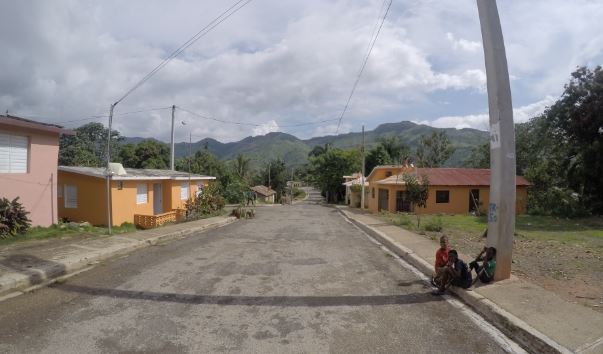Our house has two sources of luz, actually. The first is the el panel. This was a gift from an NGO, I forget which, that gave panels to the majority of la gente a few years ago.
It weighs about 20 lbs. I heft it up onto the roof every morning to and take it down every evening to keep it from growing legs and sneaking off in the night.
El panel came with the house we are renting. It connects to batteries that store the electricity it collects throughout the day.
These are connected to an inversor that connects to the wiring in the house. You turn on the inversor and voila! there's luz.
The second source is municipal electricity. You plug a cord into the wall and there's power. It works exactly like in the US except that it doesn't work all the time. Sometimes there's just not power. Most of the time, actually. This is common throughout the country, even in the Santo Domingo (link to thoughts on the third world), though para alla and in other places that have political capital there's a schedule. Not here.
La luz arrived in the pueblo shortly before we did. In this town, lacking a paved road to connect it to the rest of the world the sight of concrete palos de luz (streetlights) along the hillside seems shockingly modern. Especially when el cable connects to a wooden house with a zinc roof.
When the la luz is off we use the panel. There's a switch that flips between the two.

These two sources more or less keep us in la luz 24/7. Just like the US, right? Wrong. La luz literally means "light," and the current in the inversor isn't good for much more than that. We can charge our phones and laptop, but forget about having a refrigerator.
The house of our host mom had a hefty inversor system gifted by a son who is a técnico de la luz. It has two car batteries and an inversor of the same size. For point of comparison, our inversor is the size of a paperback dictionary.
Even with this system her TV and fridge can't run at the same time. When using panel electricity the food only stays fresh-ish: leftovers don't keep that long but at least the lettuce doesn't wilt. And that TV? It's just a TV and quite modest at that: no DVD, no home stereo system, no Xbox, etc. All of that uses more electricity than a small home solar system can provide.
Some people still have that stuff but they can only use it when la luz is on. We can tell when it's time to switch from the inversor when our neighbor is bumping Rihanna.
This makes for a lot of small differences that add up to a significantly different lifestyle. For example, people don't have carpet here. Maybe this is because it's not a very "tropical" thing but ask yourself if you would have wall to wall rugs that couldn't be shaken out if you couldn't reliably run a vacuum cleaner. The same is true for power tools. They work when la luz is on but when you're relying on an inversor any motor with a good torque makes the lights blink.
There is a phrase I have been thinking about lately, one I have read in older texts: "all the modern conveniences." These are the things to which those words refer.
Life can still get lived, and quite well, without them. It's just less convenient. Things take longer and require more work. Which mean more labor. In the DR where power is inconsistent you see two things that used to be ubiquitous in the US but are less common these days: full time housewives and domestic help.
I think that it's no stretch to say that the edifice of modern feminism was founded on a platform of cheap energy, but that's another essay for another blog.
Another entry for this blog might be an investigation into where la luz comes from and why it is so irregular. I have done zero research but I'll dare speculate that it has something to do with the fact that DR is an island that, unlike my homeland, does not span a continent and cannot mine it's own coal.
This is one reason I am skeptical of the idea of a purely green future in which everything runs on paneles and wind farms with nary a smokestack or topless mountain to blot la vista. For this to work we would need to less energy, but instead we are using ever more. I am using electricity to write these words and you are using it to read them right now, aren't you?
Our community has a Centro de Tecnológico that it's full of computers. They run great when la luz is on. When it's not, it runs off it's own generator which is the size of a minivan.

That black stuff on the pipe? That´s soot from exhaust.






